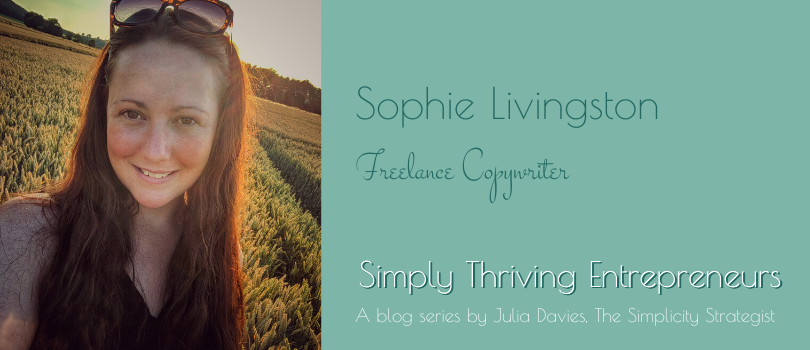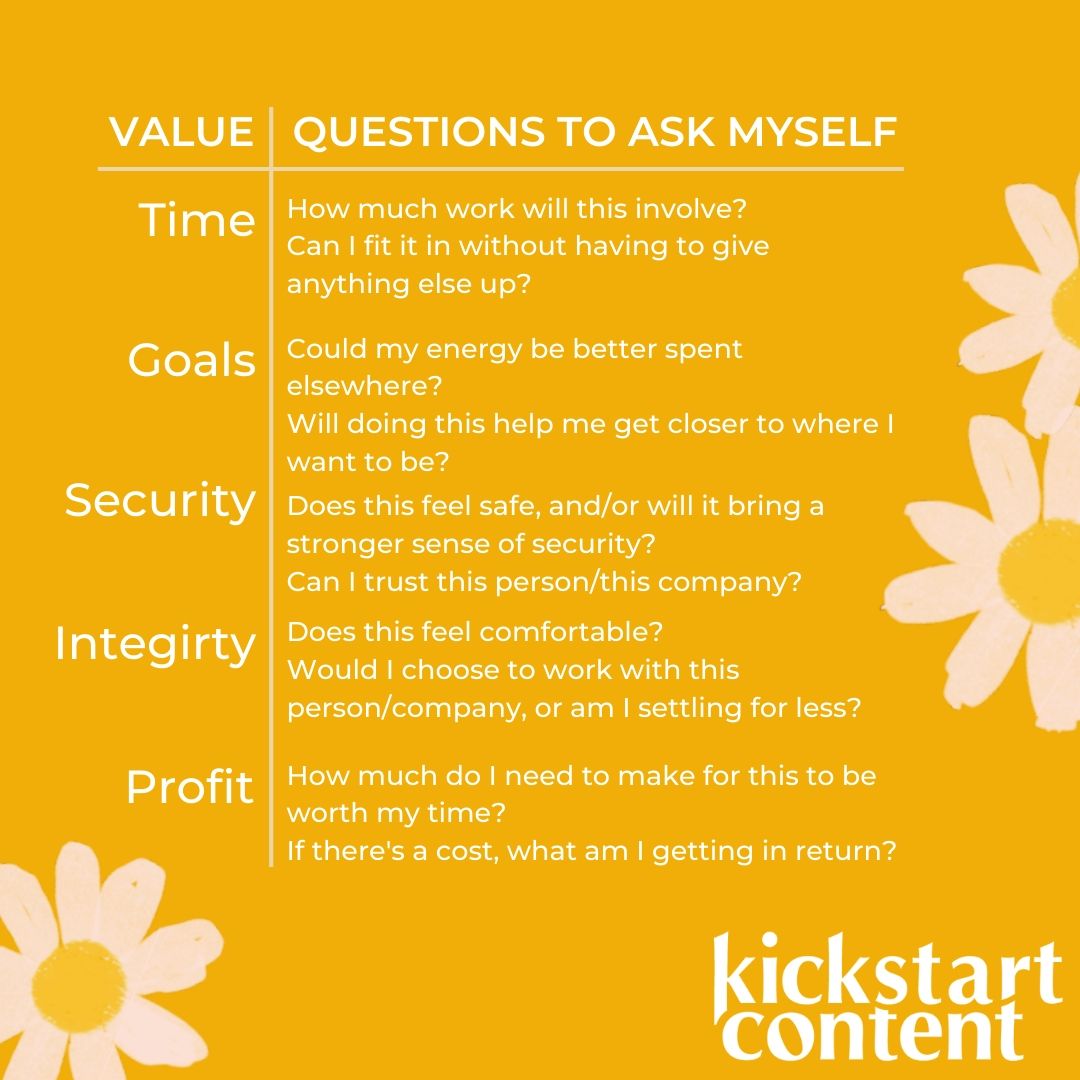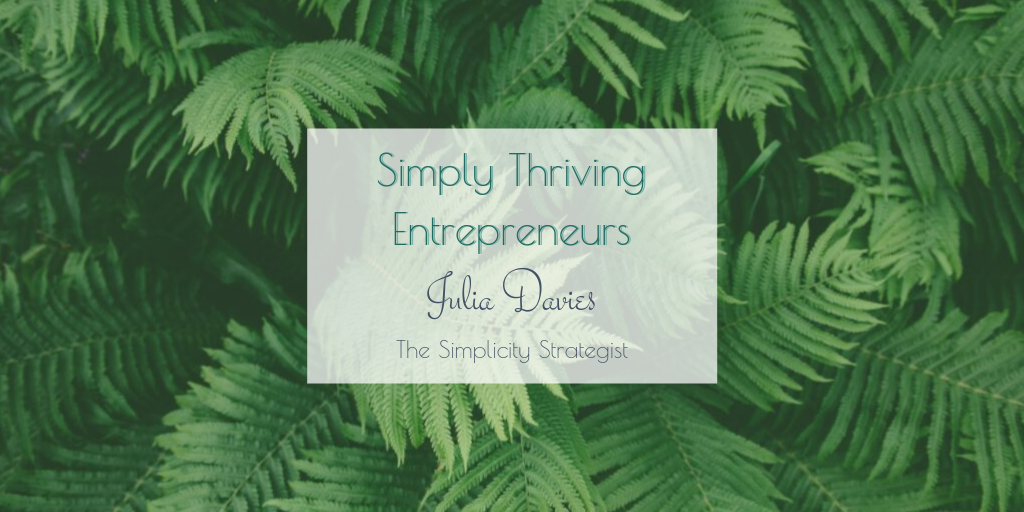May I introduce you to Sophie Livingston. I’m absolutely thrilled to be hosting a new series of blogs celebrating female entrepreneurs who are simply thriving. It’s my aim to bring you a varied range of stories featuring women who are living life on their own terms and shunning the idea that life has to take a back seat when you run your own business. Although these women will share their tips and advice, I hope this blog series also inspires you to do things your way – to carve your own path. Click here to see the first interview and to read a full explanation of what a Simply Thriving Entrepreneur is.
Sophie Livingston
Sophie is a freelance copywriter and so much more – she’s incredibly talented at building communities and connecting with people online. I’ve always admired Sophie for showing up and being honest about freelance life – and equally for switching off and taking time away from social media when she needs to. There’s so much pressure to be pushing and hustling and selling constantly when you have an online business, but Sophie is living proof that connection, community and friendship are worthy foundations to a sustainable business that really works for your lifestyle needs. I particularly loved the part of Sophie’s interview where she says that actually it’s easier to switch off and rest if you love who you’re working with and what you’re doing as it brings contentment and ease into your work. Read on to hear more tips from Sophie on boundaries, planning and reducing overwhelm.

Tell us a bit about yourself and what you do
I’m a freelance copywriter working out of my home in sunny Hull. I team up with other freelancers to help them build brands that last.
Most freelancers struggle to explain what they do. I work with them to write website copy and marketing content that will help them land their dream clients.
How do you plan your day/week?
Planning can be difficult for me because I live with chronic illness. I rebelled against routine for a couple of years, determined to prove that I didn’t need to fit myself into a nice neat box of 9-5 or similar.
I’m learning now that routine is good for me, but that there needs to be plenty of flexibility (and self-compassion) so I can prioritise my health and take time out when I need it. I typically work from 10am to 4pm, Monday to Friday.
I have a Trello board for each of my clients, and we use them to keep track of tasks, resources and conversations.
I’ll plan my week loosely in advance on a desk planner. The A3 kind that has a column for each day and a notes section running along the bottom. I plot in any calls or appointments first, and then allocate a day each to whichever of my clients are the focus for that week, plus a day to work on my own business.
At the start of each day, I’ll head to the client’s Trello board and set my main tasks for the day. I never give myself any more than 3 per day.
I try not to work evenings and weekends but sometimes, when my health is bad and I’ve had to take time off during the week, it’s unavoidable.
What does success look like to you?
Success to me looks like freedom. The freedom to choose who I work with and on what, the freedom to set my own schedule and decide how I spend my days, and the freedom to control the environment I work in.
I’m on my way there but I still have a lot of work to do. It’s a process. Constant tweaking and refining to help me get closer to where I want to be.
What does self-care mean to you, and how is that reflected in your life?
I’ve been in therapy for around 18 months now and self-care has been a recurring topic of conversation.
I’m Northern and I come from a working-class background. We’re not big on self-care around here – we’re experts at sucking it up and getting on with things.
I’m unpicking those bad habits now and learning how to take better care of myself. It’s not just a nice-to-have, but essential if I want to manage my chronic illness and mental health.
For me, it looks like regular downtime away from my work, daily walks, balanced meals, journaling, and thinking and talking about how I feel. On the bad days, it’s rest, rest and more rest. Giving myself permission to stop and trusting that I’ll be better for it in the long run.
Looking back, is there anything you would you change about your first year in business?
I made all sorts of unhealthy choices in that first year. I’d work nights to make up for sick days and push myself to work through pain, fatigue and discomfort.
I’m more in-tune with my body now and I can spot the warning signs earlier. That makes it easier to manage my symptoms.
During my first year, I worked myself into the ground. I felt a desperate need to make my business work because traditional employment felt impossible for me. What I didn’t understand, back then, was that I’d have a much better chance at making my business work if I took proper care of myself. Rest and time off is part of the process. Especially when you’re working in a creative field.
What boundaries do you have in place regarding your work/life balance?
I have strong boundaries around the type of jobs I take on and the clients I work with.
It’s taken a lot of hard work to get to a point where I can turn work away, but being able to pick my projects makes it so much easier for me to show up and enjoy what I’m doing.
It might sound contradictory, but enjoying my work makes it easier for me to switch off. I don’t feel as much pressure to keep pushing and chasing more/something else. Enjoying my work leaves me feeling satisfied and content with where I’m at.
When I’m struggling to make a decision around something that will affect my work/life balance, I use the prompts below to guide me. We might not all ask ourselves the same questions, but having something like this to refer to is really helpful.

What’s the best and worst thing about working for yourself?
It’s the same answer for both. Being in control and having the freedom to decide what my working life looks like is a privilege that I will never take for granted. But the loneliness and the internal pressure that comes with being responsible for my own income is difficult to deal with.
I’m trying to get better at asking for help and investing in myself so I can reduce that pressure and feel less alone in my work.
Please can you share a top tip for an overwhelmed entrepreneur
It might feel counterintuitive, but the best thing you can do to beat overwhelm is to step away for a while.
Take a walk, a nap or a bath. Sit with a pen and paper and empty your mind. Go for lunch with a friend or have a wander around a museum. Read a book or watch a favourite film.
Your brain has too many tabs open. Shut some of them down for a while and let it rest. I promise things will feel better on the other side.
Where can we find you online?
You can find me on Instagram or Twitter, and you can read more about my services on my website, kickstartcontent.com.



